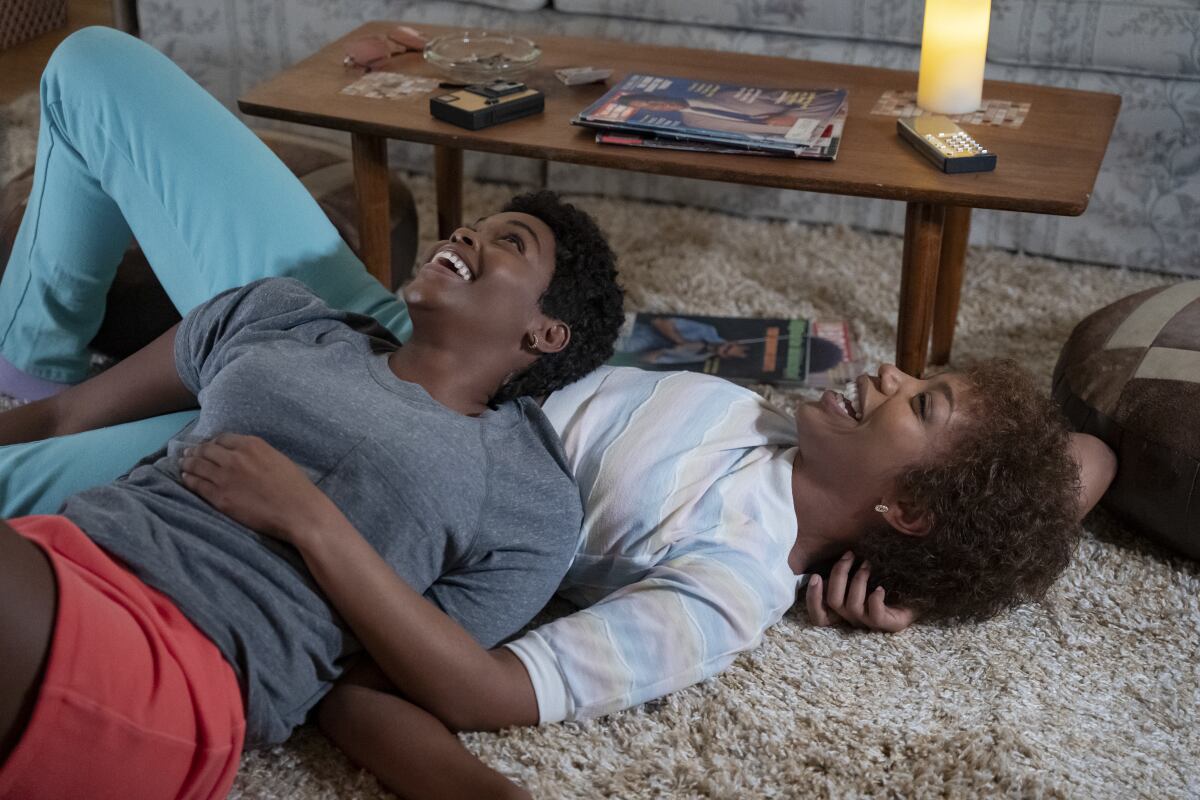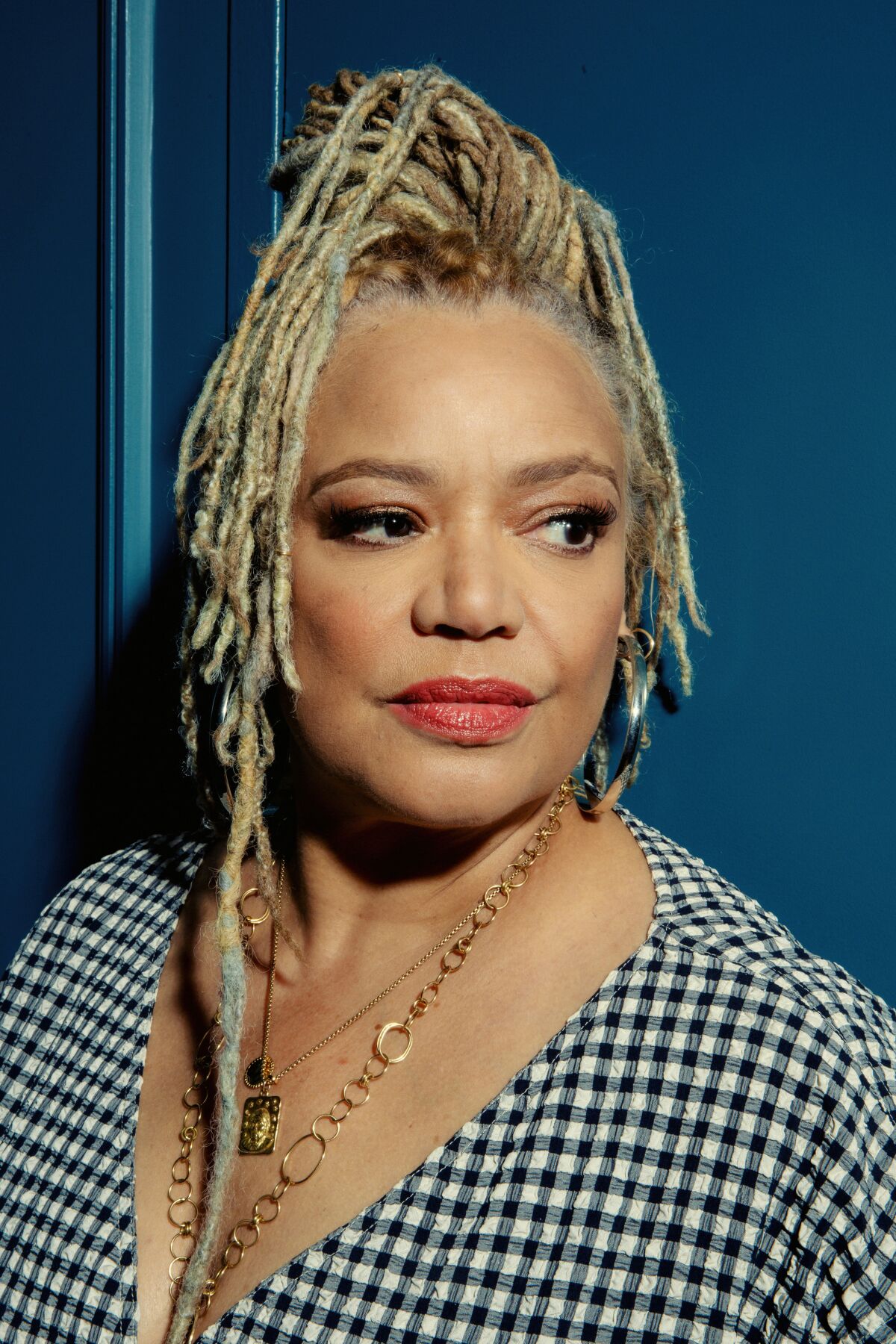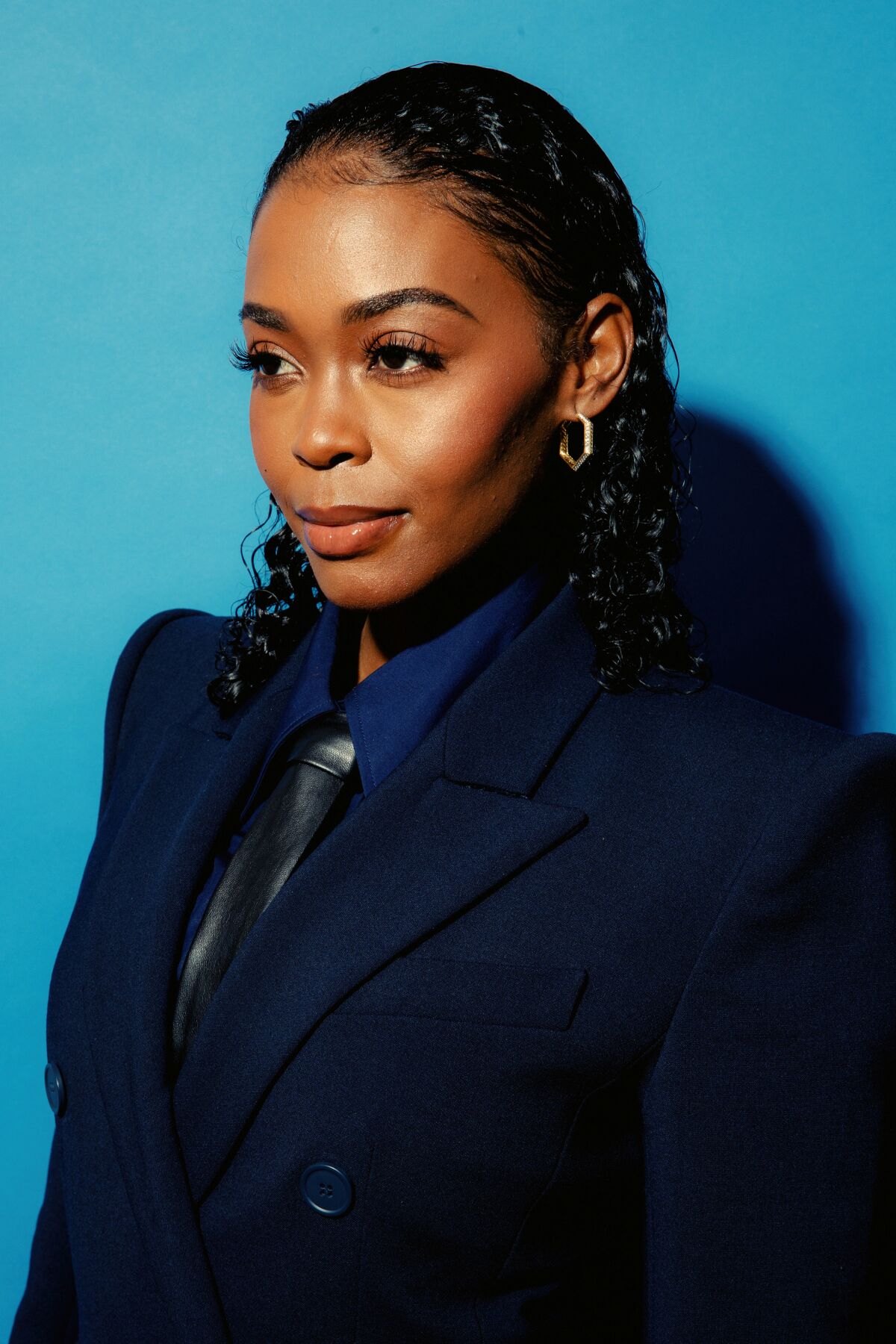Why a kiss was worth fighting for in the Whitney biopic ‘I Wanna Dance With Somebody’
Not long before Whitney Houston‘s career takes off in the Sony Pictures musical biopic “I Wanna Dance with Somebody,” the young singer shares a romantic kiss with her best friend, Robyn Crawford. It’s sweet, intimate and relatively brief, but juxtaposed against the epic highs and lows of the Grammy-winning icon’s well-publicized life, the deceptively small moment carries a huge significance.
“I love the fact that she loved who she loved and there wasn’t a lot of questioning,” said Naomi Ackie, who stars as Houston in the decades-spanning film, which openly acknowledges her long-rumored affair with Crawford.
Directed by Kasi Lemmons (“Harriet”) from a script by Anthony McCarten, the film aims to do for Houston what the writer’s 2018 Oscar-winning “Bohemian Rhapsody” did for Queen’s Freddie Mercury, examining her legacy and formative relationships with parents John and Cissy Houston, Arista Records founder Clive Davis, husband Bobby Brown and longtime confidant Crawford, whom she meets as a teenager.
The latter is one of the most important relationships depicted in the film, say the director and star, even if it shows Houston ending the romance under pressure to maintain a heteronormative public image. But not everyone involved in the project wanted the Whitney-Robyn kiss to make it on screen. “It’s the sweetest kiss. It’s like a first kiss, very romantic,” Lemmons told The Times. “And I fought for it.”

Nafessa Williams (left) and Naomi Ackie in the Whitney Houston biopic “I Wanna Dance with Somebody.”
(Emily Aragones / TriStar Pictures)
“I Wanna Dance with Somebody,” in theaters now, charts the late singer’s ascent from gospel-trained New Jersey teen to international recording star through the fame and addiction struggles that led to her tragic death in 2012.
Houston’s budding relationship with Crawford unfolds early in the film, after the young women meet while working as camp counselors around 1980. Houston is honing the gifts that will eventually earn her the nickname “The Voice,” under the tutelage of her gospel-singer mother, Cissy (Tamara Tunie). While privately she tumbles happily into love with Crawford, Houston is heavily influenced by the disapproval of her father John (Clarke Peters), whose tight control over his daughter’s budding career does not allow for an openly queer relationship.
According to Lemmons, there were behind-the-scenes debates with the singer’s estate, represented by sister-in-law Pat Houston (a producer on the movie), over how to address the relationship.
“They have feelings, and those feelings have to be respected,” said Lemmons, who says the Houston estate agreed to the inclusion of the relationship prior to her joining the project in 2021 as a replacement for Stella Meghie, who reportedly left the director’s chair over creative differences. “To their immense credit they said, ‘OK, this was part of Whitney’s life. This can be part of the movie.’”
But according to the filmmaker, the kiss between Whitney and Robyn (Nafessa Williams from “Black Lightning”) required sensitive negotiation. “I said, ‘Well, presumably they kissed. We really can surmise that there was a romance there,’” said Lemmons. “I think we all know that at one point it was beyond just friendship.”

Naomi Ackie (“Star Wars: The Rise of Skywalker,” “Master of None”) stars as Whitney Houston in “I Wanna Dance with Somebody,” in theaters now.
(Aaron DuRall / For The Times)
Houston died at the age of 48 in an accidental drowning without publicly acknowledging the oft-speculated rumors of romance with her close friend, assistant and eventual creative director. Crawford, however, finally addressed the relationship in her own 2019 memoir.
“We wanted to be together,” Crawford wrote in “A Song for You: My Life With Whitney Houston,” revealing that Houston ended things romantically when she signed her first record deal. “She said we shouldn’t be physical anymore, because it would make our journey even more difficult.”
Davis, also a producer on the project, confirmed the romance while promoting the film this week. “The movie does set the record straight,” he told Extra. “They did have a teenage, one-year affair.” Crawford could not be reached for comment.
Working closely with the estate lent valuable resources to the project, such as access to archival materials and family members and the use of Houston’s own vocal recordings, which are heard throughout the film and performed by a lip-syncing Ackie. But that working arrangement precluded the filmmakers reaching out directly to consult with Crawford or Houston’s ex, Brown, neither of whom are involved in the film.
“I wanted to, but I did not,” said Lemmons, who said she knew Crawford had a difficult relationship with the estate. “Because I was working with the estate, I was careful. People’s feelings had to be considered.”

Kasi Lemmons, director of “I Wanna Dance with Somebody.”
(Aaron DuRall / For The Times)
Instead, accounts from those who knew Houston, including Crawford’s book, helped fill in dimensions of the “profound and important” relationship. Davis’ personal stories — including revelations of an intervention attempt depicted in the film — also proved invaluable. And Lemmons drew on her own history with the “I Will Always Love You” songstress and “Bodyguard” star, whom she’d met years earlier when she developed movie scripts for her.
One meeting in particular left Lemmons “haunted.” Houston was 45 minutes late, was visibly exhausted and had difficulty focusing, she remembered. “The woman that I saw was very different than the image I had in my head of who she was,” she said. Crawford was nearby watching Houston’s daughter Bobbi Kristina, and Houston seemed distracted by a desire to re-join them. “I could feel the weight of everything on her.”
When she left, Lemmons said, Houston’s father John approached. What he said surprised her. “I thought that he was going to say, ‘I’m sorry. She’s not usually like that.’ But what he said was, ‘I’ve got a movie to pitch you that I want you to write for her. I want her to be Barbie. That’s the brand.’”
The exchange shifted Lemmons’ perspective on Whitney the icon, Whitney the woman and the pressures of mass-appeal stardom she carried on her shoulders. Lemmons leaned on those insights to make “I Wanna Dance with Somebody.” “But, of course, I would love to talk to Robyn, and I really look forward to Robyn seeing the movie,” said Lemmons. “I hope we’ve done some justice to that relationship.”

Nafessa Williams co-stars as Robyn Crawford in “I Wanna Dance with Somebody.”
(Aaron DuRall / For The Times)
Ackie landed the role of Houston after a four-month audition process involving extensive singing and dancing. Williams was cast as Crawford following a reading over Zoom, when her chemistry with Ackie was “undeniable.” While neither met with Crawford in the course of their research, both say her memoir became an essential reference.
“I felt like Robyn gave it to me and was like, ‘This is everything you need to know,’” said Williams, who noted Crawford’s relative absence from archival footage. “She wasn’t trying to be in [front of] the camera, she was behind the scenes. She literally was behind Whitney, having her back.”
Reuniting over a video chat ahead of the film’s release, the actors reflected on why it was vital to depict the relationship between Houston and Crawford not only as briefly romantic, but undefinable.
“There are people that come into your life that you have an unspeakably deep connection with, and regardless of whether it’s a friendship, a romantic relationship or otherwise, that comes rarely in a person’s life,” said Ackie. “For me, they found in each other someone who could truly understand who they were in each moment, and was accepting of that. And to show that to people — people who already love Whitney — adds another beautiful layer to who she was.”
“Someone asked me about labels, and I don’t feel comfortable answering that question for either of them because they didn’t put labels on it,” added Williams. “I think they were soulmates.”
Ackie agreed. “I think it’s quite interesting that we sometimes have the urge to put labels on everything, even when the people who are involved in the relationship don’t do it themselves,” she said. “That has always been the energy, like there’s no words for the love that we have for each other. And that was a joy to create.”
For all the latest Entertainment News Click Here
For the latest news and updates, follow us on Google News.
